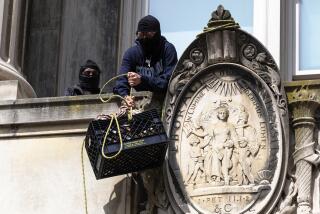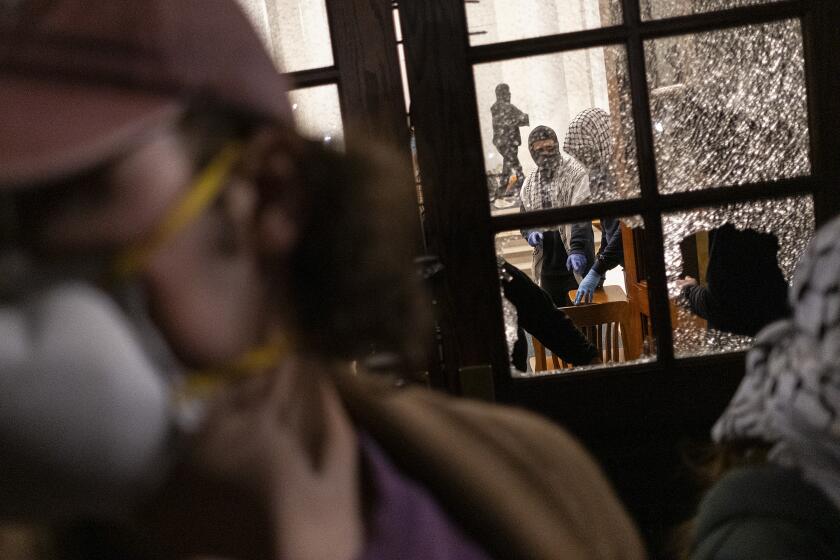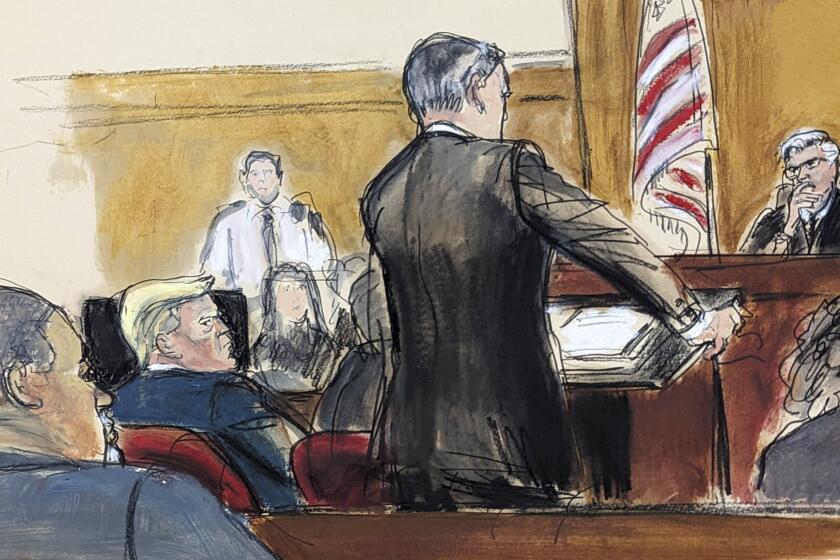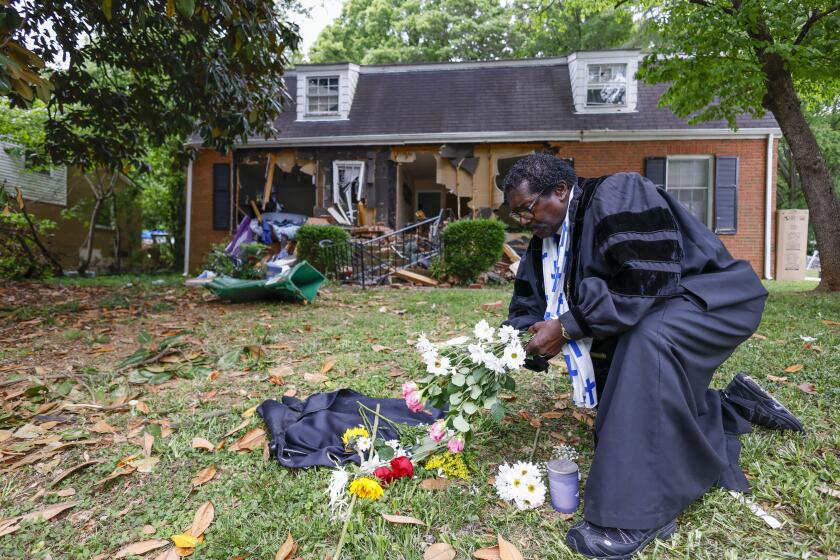N.Y. Times Breaks Silence on Jailed Writer
The New York Times’ long campaign in defense of reporter Judith Miller provoked substantial dissension within the newspaper and left it flat-footed as it tried to cover unfolding allegations that top aides in the Bush administration might have illegally exposed the identity of a CIA operative, the newspaper reported in today’s editions.
The self-analysis by the Times makes it clear that -- although Miller has previously been celebrated by the Times top management for going to jail to avoid naming a source -- her reporting and decision not to cooperate with a federal grand jury were viewed skeptically by many of her colleagues.
When asked what she regretted about the newspaper’s handling of the Miller matter, Jill Abramson, a managing editor, said: “The entire thing.”
Several media critics say the Times deserves praise for looking at itself critically, including questioning the somewhat passive role that Publisher Arthur Sulzberger Jr. and Executive Editor Bill Keller appeared to take after defending Miller’s decision not to identify her source as I. Lewis “Scooter” Libby, chief of staff to Vice President Dick Cheney.
But the critics say the Times should have been clearer about the parameters under which today’s story was reported, and why, for example, Miller was allowed to refuse to answer some questions and withhold her notes from those assigned to write about the case. The newspaper’s story and a first-person account by Miller were posted on its website Saturday.
“I don’t think the Times looks any better today than it did yesterday,” said Adam Clymer, the paper’s former chief Washington correspondent, now retired. (He left the paper before the leak case broke.)
Alex S. Jones, director of Harvard University’s Shorenstein Center on the Press, Politics and Public Policy, said that the Times account made it appear that Miller was protecting Libby and that when she finally agreed to testify, it was not for a high journalistic principle but because her jail term might have been extended.
“You can’t blame her for wanting to get out of jail,” said Jones. “But this whole thing leaves a very strange aftertaste about Scooter Libby and her relationship with him and whether she is in some fashion protecting him.”
The New York Times also published Miller’s personal account of her testimony before a federal grand jury, seated to decide whether anyone should be charged with exposing the identity of undercover CIA operative Valerie Plame.
In her account, Miller, 57, said she went to jail to protect Libby and their confidential conversations. Libby and his lawyer said they had cleared the Times reporter to speak to the grand jury, with waivers similar to those Libby gave several Washington journalists.
But Miller said it was not until she spoke to Libby by phone from jail Sept. 19 that she came to believe he truly had released her from their confidentiality agreement.
In Orange County on Saturday for a journalism conference, Miller reiterated why she had waited so long to testify in the investigation.
“I am free only because my source, my one confidential source, wrote me a personal letter and called me in jail to let me know that he really, really wanted me to testify,” Miller said during her appearance before the First Amendment Coalition at Cal State Fullerton.
Miller said in her story in today’s New York Times and in her appearance Saturday that another reason she testified after 85 days in jail was that special prosecutor Patrick J. Fitzgerald had agreed to limit his questions to her interaction with Libby.
The case entangling Libby, Miller and several other journalists began in the summer of 2003, when Libby and Karl Rove, President Bush’s chief political advisor and deputy chief of staff, began an effort to discredit Plame’s husband, a critic of the administration’s push for war in Iraq.
Journalists from NBC, the Washington Post and Time magazine eventually agreed to speak to the special prosecutor, who was trying to determine who revealed Plame’s name. All of the journalists said Libby had given them permission to disclose their conversations with him.
But Miller went to jail July 6, saying that she had not been given an unequivocal and personal waiver from her source, recently revealed to be Libby. “And she felt that if Mr. Libby had wanted her to testify, he would have contacted her directly,” according to the Times’ account. “I interpreted his silence as ‘don’t testify,’ ” Miller told her paper.
Miller received conflicting advice from two of her attorneys, Floyd Abrams and Robert S. Bennett.
Abrams believed that if she sought and received permission from Libby to testify and was released from jail, “people would say that she and the paper had simply caved in,” the Times reported.
But Bennett reportedly rejected the idea that she should simply wait for Libby to come forward. He worried that the grand jury’s term could be extended, leaving Miller in jail for up to 18 more months.
In a two-page letter dated Sept. 15, Libby made it clear that he thought Miller should testify. That was reiterated in a phone conversation that followed.
Claudia Payne, a friend and colleague of Miller, said the fact that Fitzgerald effectively could have extended Miller’s jail term for refusing to testify “changed things a great deal,” according to the Times account. “She said, ‘I don’t want to spend my life in here.’ ”
Tom Rosenstiel, director of the Washington-based Project for Excellence in Journalism, said the Times’ report left it unclear: “Is it really the waiver [from Libby] that got her to testify? Or was it that she became tired of jail?”
The New York Times story made it clear that Miller had a strained relationship with many of her co-workers. It quoted her former editor, Douglas Frantz, as saying Miller once described herself as “Miss Run Amok” -- explaining to her supervisor that she was in a position to “do whatever I want.” (Frantz recently was named a managing editor at the Los Angeles Times.)
Three of Miller’s colleagues wrote the article, which reports that Miller “generally would not discuss her interactions with her editors, elaborate on the written account of her grand jury testimony or allow reporters to review her notes.”
One of the mysteries of Miller’s reporting is why, unlike other journalists, she did not write about Plame. She said she recommended such a story to an editor, whom she declined to name. Abramson, then the Times Washington bureau chief, said she recalled no such story proposal.
That is another example of the discomfort many at the Times apparently had with the situation. Executive Editor Keller and Abramson said they felt “an almost impossible tension” had been created by the paper’s attempts to report on the story while honoring Miller’s confidentiality agreement with Libby.
Indeed, in July, reporter Richard W. Stevenson and others in the Washington bureau wrote a story about the Libby leak case. The story did not run because it did not break new ground, Stevenson said he was told. But he felt it was killed because it could “complicate Judy’s situation,” the Times reported today.
Similarly, the Times’ current Washington bureau chief, Philip Taubman, said a memo by two other reporters about coverage of the case went nowhere, according to today’s Times report. Keller, in Taubman’s view, “did not want them pursued because of the risk of provoking Mr. Fitzgerald or exposing Mr. Libby while Ms. Miller was in jail,” the paper reported.
Shortly after Keller became editor in 2003, he removed Miller from coverage of weapons issues. In May 2004, he ran an extensive editors’ note that conceded the Times had too readily accepted reports that Iraq had weapons of mass destruction. Miller wrote, or helped to write, five of the six stories that were cited as too credulous, though no reporter was named in the note.
The Times’ account today quoted Keller as saying that he backed Miller in her decision to go to jail rather than testify, because of the importance of protecting confidential sources. He acknowledged that the case did not put the paper in an ideal situation.
Keller said: “I wish it had been a clear-cut whistle-blower’s case. I wish it had been a reporter who came with less public baggage.”
Times staff writer Doug Smith contributed to this report.
More to Read
Start your day right
Sign up for Essential California for news, features and recommendations from the L.A. Times and beyond in your inbox six days a week.
You may occasionally receive promotional content from the Los Angeles Times.







